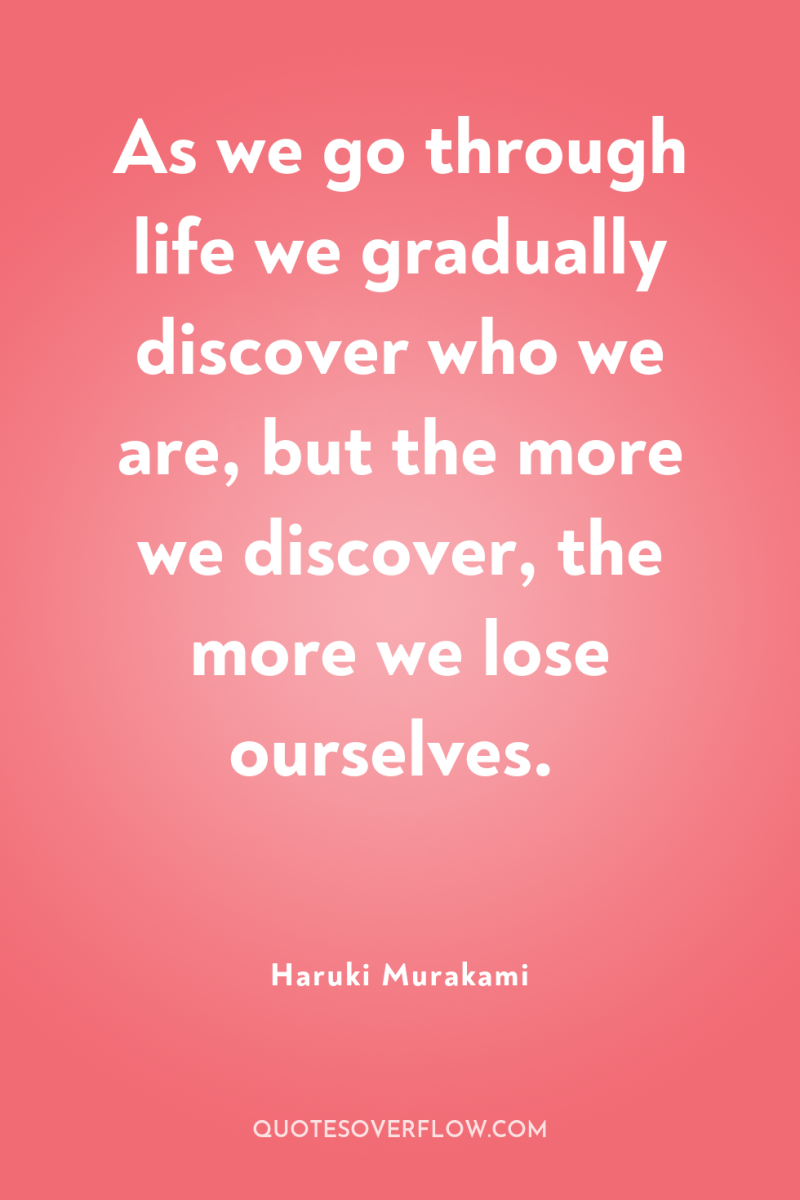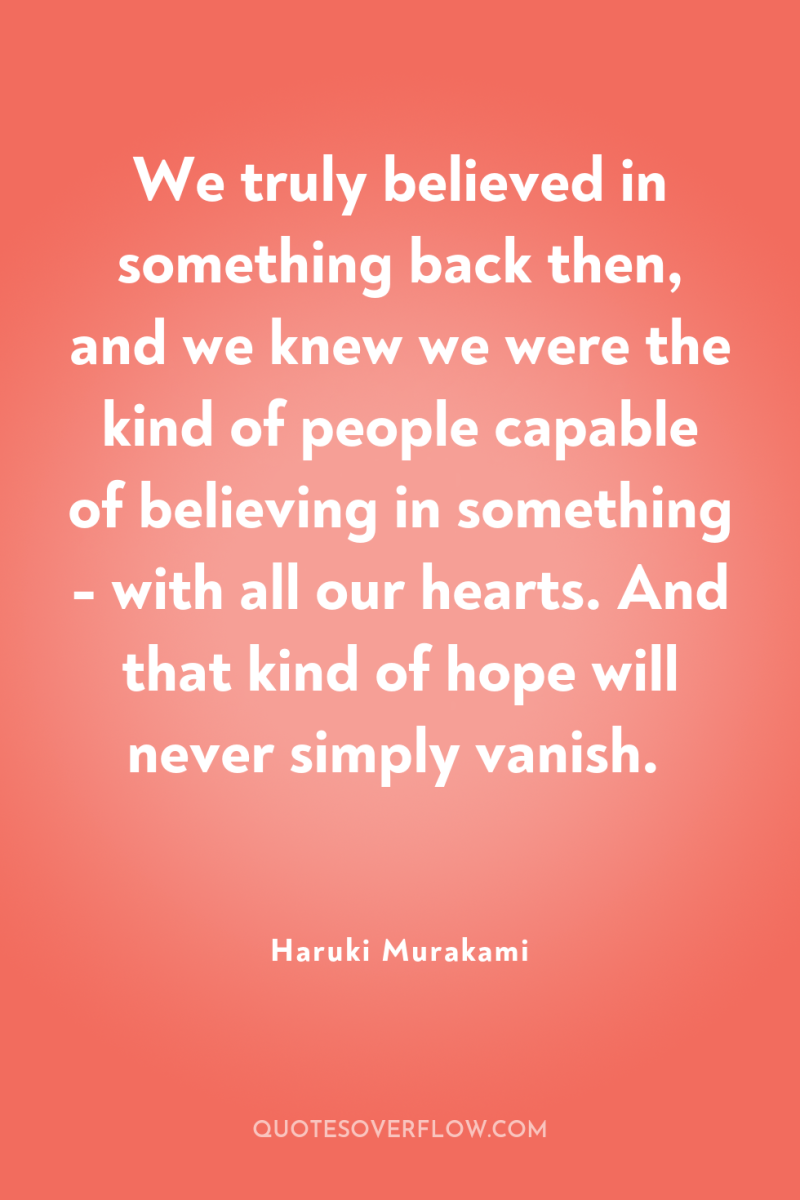
1
As we go through life we gradually discover who we are, but the more we discover, the more we lose ourselves.Haruki Murakami

2
Some things in life are too complicated to explain in any language.Haruki Murakami

3
Life is long, and sometimes cruel. Sometimes victims are needed. Someone has to take on that role. And human bodies are fragile, easily damaged. Cut them, and they bleed.Haruki Murakami
4
Everything has boundaries. The same holds true with thought. You shouldn't fear boundaries, but you should not be afraid of destroying them. That's what is most important if you want to be free: respect for and exasperation with boundaries.Haruki Murakami

5
We truly believed in something back then, and we knew we were the kind of people capable of believing in something - with all our hearts. And that kind of hope will never simply vanish.Haruki Murakami

6
Aren't you afraid of dying? Not really. I've watched lots of good-for-nothing, worthless people die, and if people like that can do it, then I should be able to handle it.Haruki Murakami
7
Strictly speaking, it might not be a dream. It was reality, but a reality imbued with all the qualities of a dream. A different sphere of reality, where - at a special time and place - imagination had been set free.Haruki Murakami
8
One other thing I learned from working in a company was that the majority of people in the world have no problem following orders. They're actually happy to be told what to do. They might complain, but that's not how they really feel. They just grumble out of habit. If you told them to think for themselves, and make their own decisions and take responsibility for them, they'd be clueless.Haruki Murakami
9
The heart apparently doesn’t stop that easily.Haruki Murakami
10
Haida stopped and glanced at the clock on the wall. Then he looked at Tsukuru. He was, of course, Haida the son, but Haida the father has been the same age in his story, and so the two of them began to overlap in Tsukuru's mind. It was an odd sensation, as if the two distinct temporalities had blended into one. Maybe it wasn't the father who had experienced this, but the son. Maybe Haida was just relating it as if his father had experienced it, when in reality he was the one who had. Tsukuru couldn't shake this illusion. .Haruki Murakami
11
Every person should decide for himself how happy, or unhappy, our society might be.Haruki Murakami
12
I've been clinging to this world like a discarded shell of an insect stuck to a branch, about to be blown off forever by a gust of wind.Haruki Murakami
13
The feeling of the wind, the sound of rushing water, the sense of sunlight breaking through the clouds, the colors of flowers as the seasons changed - everything around him felt changed, as if they had all been recast.Haruki Murakami
14
It was a different sense of isolation from what he normally felt in Japan. And not such a bad feeling, he decided. Being alone in two senses of the word was maybe like a double negation of isolation. In other words, it made perfect sense for him, a foreigner, to feel isolated here. The thought calmed him. He was in exactly the right place.Haruki Murakami
15
He wasn't normally conscious of it, but there was one part of his body that was extremely sensitive, somewhere along his back. This soft, subtle spot he couldn't reach was usually covered by something, so that it was invisible to the naked eye. But when, for whatever reason, that spot became exposed and someone's finger pressed down on it, something inside him would stir. A special substance would be secreted, swiftly carried by his bloodstream to every corner of his body. That special stimulus was both a physical sensation and a mental one, creating vivid images in his mind. The first time he met Sara, he felt an anonymous finger reach out and push down forcefully on that trigger on his back. The day they met they talked for a long time, though he couldn't recall much of what they said. What he did recall was the special feeling on his back, and the indefinably thrilling sensation it brought to his mind and body. One part of him relaxed, one part tightened up. That sort of feeling. But what did it mean? Tsukuru thought about it for days, but he was not, by nature, adept at abstract thinking. So Tsukuru emailed Sara and invited her to dinner. He was determined to find out the meaning of that feeling, of that sensation. .Haruki Murakami
16
People do change. And no matter how close we once were, and how much we opened up to each other, maybe neither of us know anything substantial about the other.Haruki Murakami
17
People do change. And no matter how close we once were, and how much we opened up to each other, maybe neither if us know anything substantial about the other.Haruki Murakami
18
He calmed himself, shut his eyes, and fell asleep. The rear light of consciousness, like the last express train of the night, began to fade into the distance, gradually speeding up, growing smaller until it was, finally, sucked into the depths of night, where it disappeared. All that remained was the sound of the wind slipping through a stand of white birch trees.Haruki Murakami
19
At some point paradise would be lost.Haruki Murakami
20
Talent can be a nice thing to have sometimes. You look good, attract attention, and if you’re lucky, you make some money. Women flock to you. In that sense, having talent’s preferable to having none. But talent only functions when it’s supported by a tough, unyielding physical and mental focus. All it takes is one screw in your brain to come loose and fall off, or some connection in your body to break down, and your concentration vanishes, like the dew at dawn.[…] If talent’s the foundation you rely on, and yet it’s so unreliable that you have no idea what’s going to happen to it the next minute, what meaning does it have? .Haruki Murakami
21
Every person has their own colour.Haruki Murakami